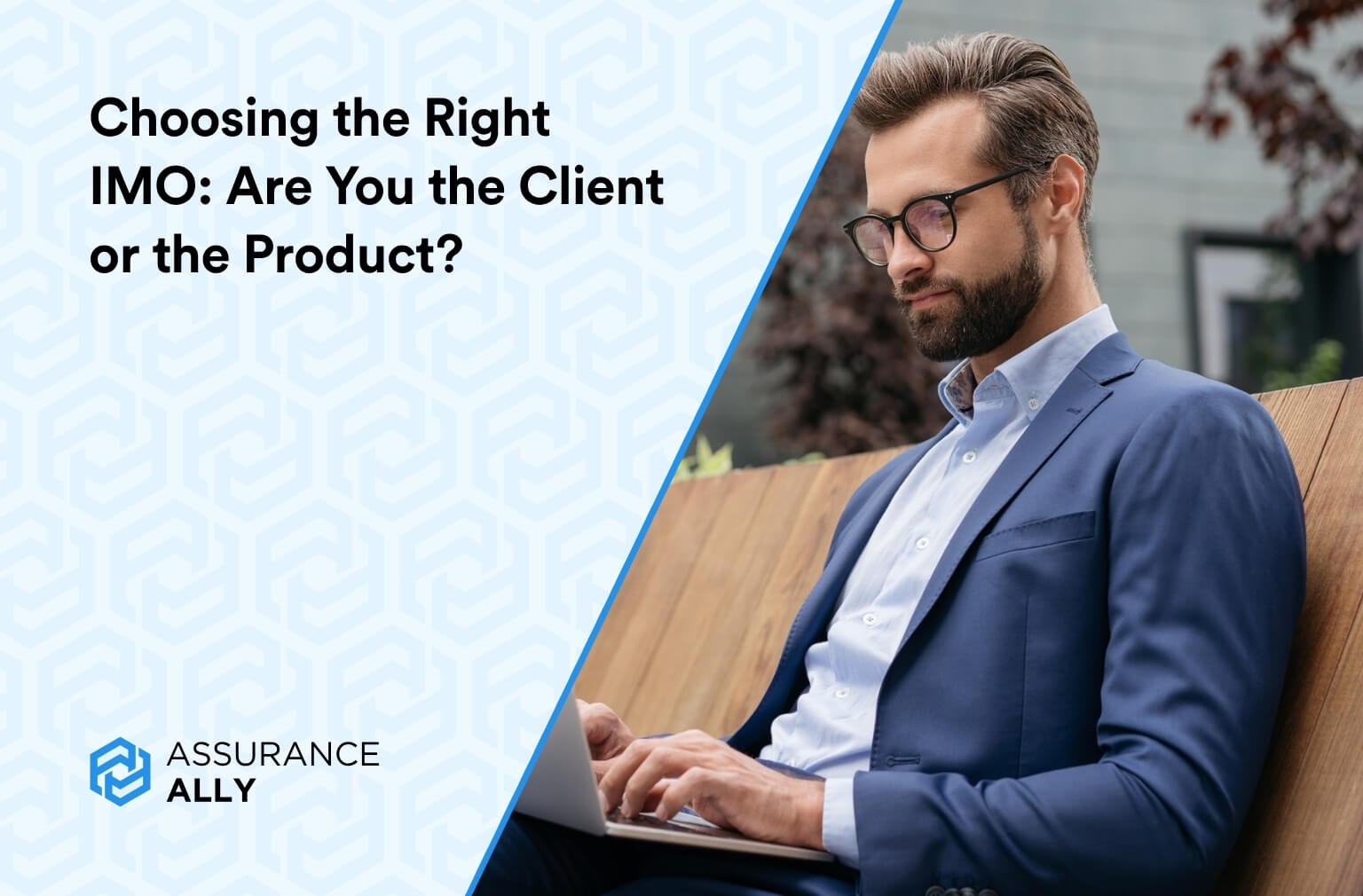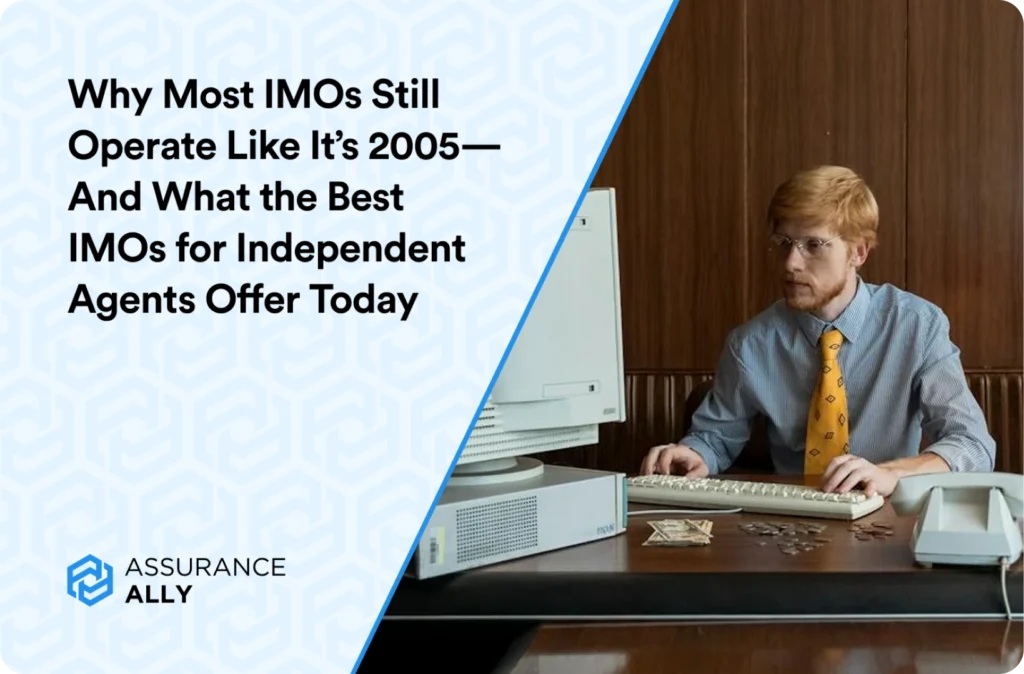Choosing the Right IMO: Are You the Client or the Product?
Jun 19, 2025• 4 Mins Read

Here’s an uncomfortable truth: most IMOs don’t make money because agents succeed. They make money from agents producing volume. Override commissions, backend carrier incentives, and production-based bonus structures form the core revenue stream for many IMOs—not your profitability or business longevity.
That means your production volume is what keeps their lights on. The more you sell, the more they earn—not necessarily because you’re growing a solid business, but because you’re fueling their internal targets. In this dynamic, you’re not a client; you’re a monetized asset. So, should insurance agents switch IMOs when the relationship feels transactional? Possibly. If your IMO is more focused on hitting carrier volume tiers than helping you build equity, that’s a flashing signal that your goals may be misaligned.
Choosing the right IMO means digging into how your IMO makes money—and how that incentive structure shapes what kind of support you get. Are you seen as a long-term partner, or a short-term revenue stream? If your IMO’s priorities don’t reflect yours, it’s time to ask better questions—and consider better options.
Who Owns What You Build? A Key Consideration in How to Choose an IMO
Your database. Your client pipeline. Your marketing. Your CRM. Your team infrastructure. Who owns them—and can you walk away with them intact?
If your business assets are locked behind systems, tools, or agreements controlled by your IMO, then you don’t truly own what you’re building. You’re leasing your future. Choosing the right IMO means prioritizing autonomy and portability.
This isn’t just a matter of convenience—it’s a matter of control. Your ability to scale, pivot, or exit depends on your ability to take your systems, data, and strategy with you. Some IMOs keep their agents reliant by embedding everything within their own platforms, making it difficult to transition without disruption. That’s not support—that’s entrapment.
Ask sharper questions:
- Is my CRM mine, or theirs?
- Can I export my data without friction?
- If I leave, will my business suffer—or keep moving uninterrupted?
Choosing the right IMO means working with a partner who respects your independence and gives you the tools to build a business you can scale—or sell—on your own terms.
Production vs. Growth: Should Insurance Agents Switch IMOs If They’re Stuck in a Producer Trap?
IMOs love producers. Producers generate volume, drive revenue, and hit carrier bonus thresholds. But volume isn’t the same as value—and production isn’t synonymous with growth. The danger for many agents is getting trapped in a model where their worth is measured solely by the number of policies they sell, not the strength or scalability of the business they’re building.
If your IMO is fixated only on activity—quotas, production benchmarks, pushing specific products—you’re being steered toward a treadmill. It’s exhausting, unsustainable, and ultimately limiting. You may earn solid commissions today, but without infrastructure, systems, or a path to leverage, you’re building a job, not a business.
Growth, by contrast, is about leverage, scalability, and ownership. It’s about creating repeatable processes, building client loyalty, and expanding your capacity without burning out. A truly growth-oriented IMO will help you think beyond this month’s production and into next year’s sustainability. They’ll support you in delegating low-value tasks, building a team, and planning for succession—not just pushing more applications across your desk.
So, should insurance agents switch IMOs if they’re stuck in this producer trap? Absolutely—if they want something more enduring than a paycheck. Choosing the right IMO means choosing a partner that helps you grow something worth owning, not just selling more policies.
Reframe the Relationship: What If You Were the Client?
What would it look like if your IMO treated you like their most important customer—not just a commission engine?
Think about the shift in mindset. Instead of being managed to hit someone else’s numbers, you’d be supported in building your own business vision. Instead of generic sales hype, you’d get real business consulting. Instead of restrictive hierarchies, you’d have the flexibility to build your structure, your way.
A client-first IMO model means tailored comp structures, ongoing business coaching, and proactive succession planning. It means access to a collaborative infrastructure—especially in a virtual family office environment—where tax experts, legal professionals, business advisory and financial strategists align to support your client’s holistic outcomes.
If your IMO hasn’t even offered you those things, it’s worth questioning why. Maybe you’ve accepted too little for too long. Maybe you’ve confused being busy with being supported. Choosing the right IMO means partnering with one that helps you grow your value—not just their bottom line.
Forward-looking agents are already shifting to models where they’re treated like clients—and their clients reap the benefits. Should insurance agents switch IMOs? If you’re not being treated like a client, the better question is: why haven’t you switched yet?
Assurance Ally: The IMO That Treats Advisors Like Clients, Not Commodities
Assurance Ally was built differently. As a boutique IMO, it’s designed for advisors and agents who value real partnership—not transactional volume.
Here’s what sets Assurance Ally apart:
- 1:1 Relationship Support: You’re never just a number. You’ll work directly with a dedicated case consultant who knows your business and advocates for your success.
- Virtual Family Office Collaboration: With deep VFO experience, Assurance Ally helps you offer clients holistic planning—partnering with CPAs, tax experts, legal pros, and more behind the scenes.
- Over 50 Carrier Options: Your clients get the best-fit solution—not what the IMO is incentivized to push.
- Administrative Support: Less paperwork for you. More bandwidth to focus on growth.
- Advisor Partner Program: You can plug in an expert Assurance Ally Advisor to handle life insurance, annuities, or DI sales—no need to become a product specialist yourself.
This is how to choose an IMO that’s truly aligned with your business goals.
If you’re tired of feeling like the product—and ready to be treated like the client—it’s time to talk.
Schedule a call with our team to learn what a real partnership feels like.
Frequently Asked Questions
1. How do I know when to switch IMOs?
If your IMO isn’t providing transferable infrastructure, personalized support, or autonomy, it’s time to ask: should insurance agents switch IMOs? Probably.
2. What should I look for when choosing the right IMO?
Look for transparency, scalability support, access to a wide carrier base, and a team that treats you like a business partner—not just a sales channel. That’s how to choose an IMO that aligns with your growth.
3. Is it really worth switching IMOs if I’m already established?
Yes—if your current IMO is limiting your business independence. Choosing the right IMO isn’t about comfort—it’s about control, long-term value, and future exit opportunities.



